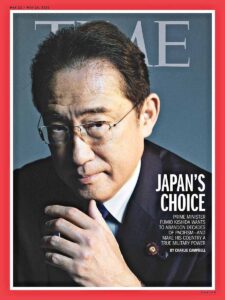Notes
Self-defense Forces 自衛隊;
—————————-
“Time” magazine is one of the best-known news magazines in the world. It has four different editions, one for the U.S., one for Europe, the Middle East and Africa, one for Asia, and one for the South Pacific. The latest edition is interesting because King Charles III is on the front cover of three editions, but Prime Minister Kishida in on the cover of the Asian edition. “Time” chose him because he is the chair of this year’s G7 Summit. It will be held in his hometown of Hiroshima City. The article says that Kishida has been a successful prime minister because he is quiet and hardworking. However, not everyone in Japan is happy with his idea of making the country’s Self-defense Forces (“jieitai”) stronger. (by Prof. Douglas Jarrell)
—————————-

Image from Time magazine’s website.Prime Minister Fumio Kishida appears on the cover of Time magazine’s (online edition).